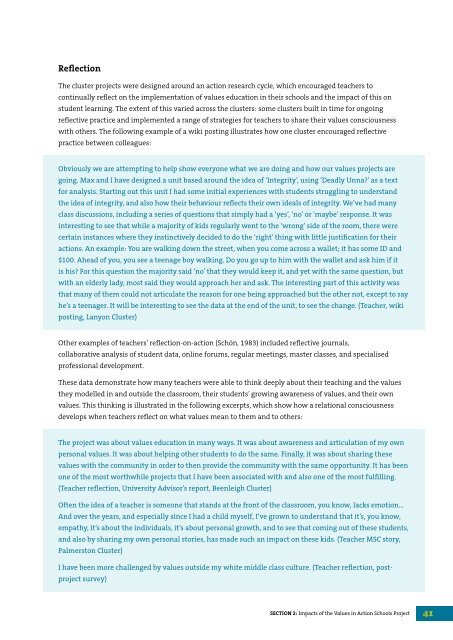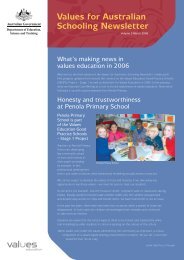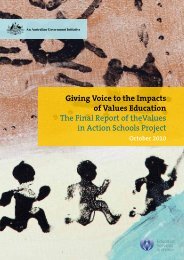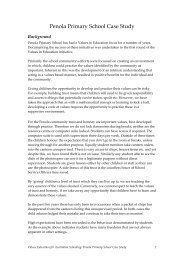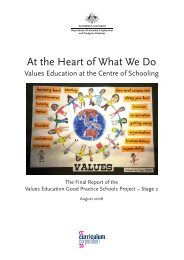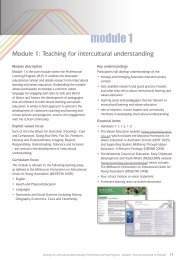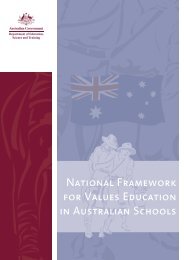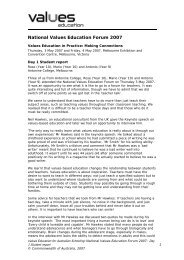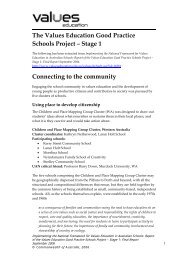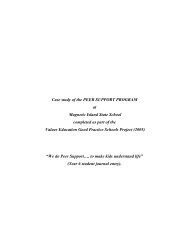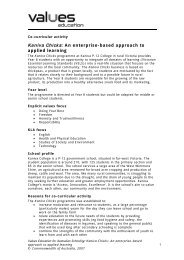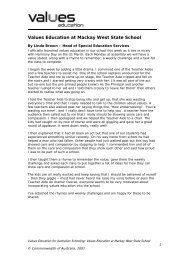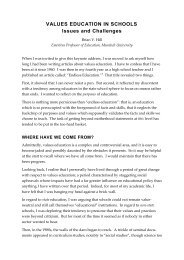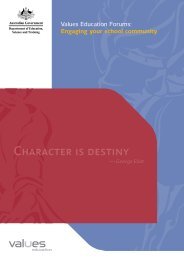Giving Voice to the Impacts of Values Education The Final Report of ...
Giving Voice to the Impacts of Values Education The Final Report of ...
Giving Voice to the Impacts of Values Education The Final Report of ...
Create successful ePaper yourself
Turn your PDF publications into a flip-book with our unique Google optimized e-Paper software.
Reflection<br />
<strong>The</strong> cluster projects were designed around an action research cycle, which encouraged teachers <strong>to</strong><br />
continually reflect on <strong>the</strong> implementation <strong>of</strong> values education in <strong>the</strong>ir schools and <strong>the</strong> impact <strong>of</strong> this on<br />
student learning. <strong>The</strong> extent <strong>of</strong> this varied across <strong>the</strong> clusters: some clusters built in time for ongoing<br />
reflective practice and implemented a range <strong>of</strong> strategies for teachers <strong>to</strong> share <strong>the</strong>ir values consciousness<br />
with o<strong>the</strong>rs. <strong>The</strong> following example <strong>of</strong> a wiki posting illustrates how one cluster encouraged reflective<br />
practice between colleagues:<br />
Obviously we are attempting <strong>to</strong> help show everyone what we are doing and how our values projects are<br />
going. Max and I have designed a unit based around <strong>the</strong> idea <strong>of</strong> ‘Integrity’, using ‘Deadly Unna’ as a text<br />
for analysis. Starting out this unit I had some initial experiences with students struggling <strong>to</strong> understand<br />
<strong>the</strong> idea <strong>of</strong> integrity, and also how <strong>the</strong>ir behaviour reflects <strong>the</strong>ir own ideals <strong>of</strong> integrity. We’ve had many<br />
class discussions, including a series <strong>of</strong> questions that simply had a ‘yes’, ‘no’ or ‘maybe’ response. It was<br />
interesting <strong>to</strong> see that while a majority <strong>of</strong> kids regularly went <strong>to</strong> <strong>the</strong> ‘wrong’ side <strong>of</strong> <strong>the</strong> room, <strong>the</strong>re were<br />
certain instances where <strong>the</strong>y instinctively decided <strong>to</strong> do <strong>the</strong> ‘right’ thing with little justification for <strong>the</strong>ir<br />
actions. An example: You are walking down <strong>the</strong> street, when you come across a wallet; it has some ID and<br />
$100. Ahead <strong>of</strong> you, you see a teenage boy walking. Do you go up <strong>to</strong> him with <strong>the</strong> wallet and ask him if it<br />
is his For this question <strong>the</strong> majority said ‘no’ that <strong>the</strong>y would keep it, and yet with <strong>the</strong> same question, but<br />
with an elderly lady, most said <strong>the</strong>y would approach her and ask. <strong>The</strong> interesting part <strong>of</strong> this activity was<br />
that many <strong>of</strong> <strong>the</strong>m could not articulate <strong>the</strong> reason for one being approached but <strong>the</strong> o<strong>the</strong>r not, except <strong>to</strong> say<br />
he’s a teenager. It will be interesting <strong>to</strong> see <strong>the</strong> data at <strong>the</strong> end <strong>of</strong> <strong>the</strong> unit, <strong>to</strong> see <strong>the</strong> change. (Teacher, wiki<br />
posting, Lanyon Cluster)<br />
O<strong>the</strong>r examples <strong>of</strong> teachers’ reflection-on-action (Schön, 1983) included reflective journals,<br />
collaborative analysis <strong>of</strong> student data, online forums, regular meetings, master classes, and specialised<br />
pr<strong>of</strong>essional development.<br />
<strong>The</strong>se data demonstrate how many teachers were able <strong>to</strong> think deeply about <strong>the</strong>ir teaching and <strong>the</strong> values<br />
<strong>the</strong>y modelled in and outside <strong>the</strong> classroom, <strong>the</strong>ir students’ growing awareness <strong>of</strong> values, and <strong>the</strong>ir own<br />
values. This thinking is illustrated in <strong>the</strong> following excerpts, which show how a relational consciousness<br />
develops when teachers reflect on what values mean <strong>to</strong> <strong>the</strong>m and <strong>to</strong> o<strong>the</strong>rs:<br />
<strong>The</strong> project was about values education in many ways. It was about awareness and articulation <strong>of</strong> my own<br />
personal values. It was about helping o<strong>the</strong>r students <strong>to</strong> do <strong>the</strong> same. <strong>Final</strong>ly, it was about sharing <strong>the</strong>se<br />
values with <strong>the</strong> community in order <strong>to</strong> <strong>the</strong>n provide <strong>the</strong> community with <strong>the</strong> same opportunity. It has been<br />
one <strong>of</strong> <strong>the</strong> most worthwhile projects that I have been associated with and also one <strong>of</strong> <strong>the</strong> most fulfilling.<br />
(Teacher reflection, University Advisor’s report, Beenleigh Cluster)<br />
Often <strong>the</strong> idea <strong>of</strong> a teacher is someone that stands at <strong>the</strong> front <strong>of</strong> <strong>the</strong> classroom, you know, lacks emotion…<br />
And over <strong>the</strong> years, and especially since I had a child myself, I’ve grown <strong>to</strong> understand that it’s, you know,<br />
empathy, it’s about <strong>the</strong> individuals, it’s about personal growth, and <strong>to</strong> see that coming out <strong>of</strong> <strong>the</strong>se students,<br />
and also by sharing my own personal s<strong>to</strong>ries, has made such an impact on <strong>the</strong>se kids. (Teacher MSC s<strong>to</strong>ry,<br />
Palmers<strong>to</strong>n Cluster)<br />
I have been more challenged by values outside my white middle class culture. (Teacher reflection, postproject<br />
survey)<br />
Section 2: <strong>Impacts</strong> <strong>of</strong> <strong>the</strong> <strong>Values</strong> in Action Schools Project<br />
41


